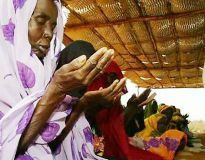Sudan in denial over Darfur rapes – UN official
By Opheera McDoom
KHARTOUM, Sept 25 (Reuters) – Sudan is in denial about the extent of rape in refugee camps in its traumatized Darfur region where fear and distrust of the government is pervasive, the United Nations’ top human rights official said on Saturday.
 Aid officials in Darfur say many women are raped or attacked when they leave the camps to collect firewood, vital to cook food and for trade.
Aid officials in Darfur say many women are raped or attacked when they leave the camps to collect firewood, vital to cook food and for trade.
“I think the government as a whole is in denial about the scale and the severity of the problem,” U.N. High Commissioner for Human Rights Louise Arbour said on Saturday after a week-long trip to the remote west of Sudan.
“I don’t believe that it is credible to believe that the women who are coming forward are fabricating stories that would bring this amount of shame and stigmatization upon themselves. It’s bizarre,” she told reporters in Khartoum.
Government officials admit there is some rape, but deny a systematic problem, saying many women exaggerate their stories.
“There is a credible base of evidence that there is a severe, severe, serious amount of sexual violence that is not being properly addressed,” Arbour said.
“There is a serious gap or disconnect between the perception of the reality on the ground by the government and the perception of that reality by everybody else.”
After years of low-level conflict between Arab nomads and non-Arab farmers over scarce resources in arid Darfur, African tribal rebels launched a revolt accusing Khartoum of neglect and arming marauding Arab militias, known as Janjaweed, to loot and burn non-Arab villages.
Nearly 1.5 million people have been driven from their homes and 50,000 people killed in 19 months of fighting.
The government admits arming some militias to fight the rebels but denies any links to the Janjaweed, calling them outlaws.
The United States has said the Darfur violence constitutes genocide.
Juan Mendez, the U.N. secretary-general’s special advisor on the prevention of genocide who traveled with Arbour, said he was not looking for signs of genocide on this mission, but how to ensure security for refugees within Darfur.
“We did look for a means by which whatever is happening or has happened will not in the future deteriorate into genocide,” he said.
Arbour said she would be recommending an increased international presence on the ground, in various capacities, and more African Union monitors with a wider mandate.
Currently about 150 AU observers, with 300 troops to protect them, monitor a shaky April cease-fire, which has been violated 20 times in the past month alone.
She said there was a “prevailing atmosphere of fear and distrust” in the camps she described in a statement as “prisons without walls” and that people were not ready to go home, despite government reports that thousands had voluntarily made the journey.
But Mendez said some people had been driven home out of desperation. In one village, he said people had returned after spending two months without receiving aid in a camp near the capital of West Darfur state.
“They chose to go back to a dangerous situation because it was the only way that they could feed their children and feed themselves,” he said.
